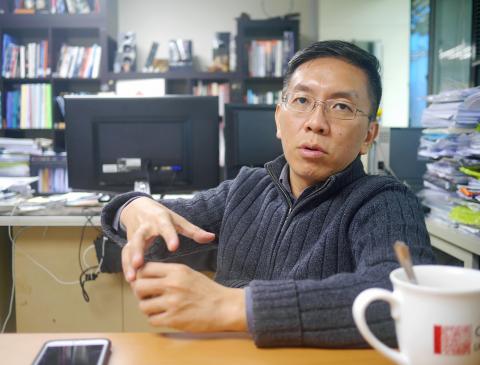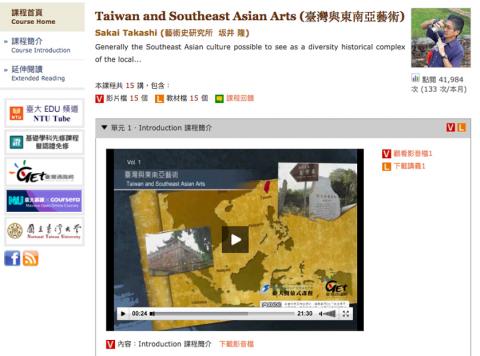Last month, National Taiwan University (NTU) opened an online course portal specifically targeting Southeast Asia offering dozens of courses, hundreds of video tutorials and thousands of lectures on topics ranging from machine learning to marketing, all free of charge.
However, Ngoi Qi Ying, an overseas Chinese student from Malaysia says that without local language subtitles (the courses are currently all in Chinese), the portal will be of limited value to those wanting to access quality Taiwanese education.
Created by NTU’s Center for Learning Development in partnership with the Taipei Economic and Cultural Office in Thailand, team leader Chien Shiuh-shen (簡旭伸) hails the project as a critical step for NTU in becoming a knowledge platform in Southeast Asia.

Photo: Liam Gibson
The portal is structured into four curriculum streams: information technology, business management, humanities in history and Asia Pacific studies. Students can enroll in Massive Online Open Courses, or MOOCs, which are a type of e-learning course made available on the Internet to large numbers of people without charge, or simply access the video tutorials and lectures.
Chien says it is the center’s core mission to make higher education resources public, for use by citizens of the global community regardless of where they live or what time they can study.
“As we are a very good university in the region, it is incumbent upon us to share this expert knowledge,” he says.

Photo: Liam Gibson
Ngoi, who has been studying life science at NTU for three years, says she thinks the project is a positive development. But what Malaysians really need is content in their national language.
“Malaysia is a multicultural country,” she says. “Malay, the national language, is the primary language spoken among Malays, Chinese and Indians alike.”
“If the courses are taught in Chinese, the other ethnic groups won’t be able to understand and won’t benefit,” she says.

Photo: Liam Gibson
Ngoi says adding subtitles to the videos in local languages would help overcome the issue.
Chien says the center is currently expanding its range of English-language courses, as English is the most commonly spoken language throughout the region. He adds that after sufficient English-language content is added, the center will start on Southeast Asian local languages.
However, there is a broader challenge facing the portal — which is spreading the word. Yong Yu Wei, a Malaysian-Chinese student studying at National Taiwan Normal University, says that while the portal sounds like a great resource, most people probably won’t know about it.
Indeed, none of the four Southeast Asian students interviewed for this report had heard of the portal.
Based on the Web site data, the portal has had nearly 1,000 visitors since launching last month on Nov. 24, around 300 from outside of Taiwan and 100 from Thailand alone.
Chien says that while these figures are encouraging, more work needs to be done to raise awareness about the resource and that the center is currently contacting both NTU student groups and organizations across the region to do this.

On April 26, The Lancet published a letter from two doctors at Taichung-based China Medical University Hospital (CMUH) warning that “Taiwan’s Health Care System is on the Brink of Collapse.” The authors said that “Years of policy inaction and mismanagement of resources have led to the National Health Insurance system operating under unsustainable conditions.” The pushback was immediate. Errors in the paper were quickly identified and publicized, to discredit the authors (the hospital apologized). CNA reported that CMUH said the letter described Taiwan in 2021 as having 62 nurses per 10,000 people, when the correct number was 78 nurses per 10,000

As we live longer, our risk of cognitive impairment is increasing. How can we delay the onset of symptoms? Do we have to give up every indulgence or can small changes make a difference? We asked neurologists for tips on how to keep our brains healthy for life. TAKE CARE OF YOUR HEALTH “All of the sensible things that apply to bodily health apply to brain health,” says Suzanne O’Sullivan, a consultant in neurology at the National Hospital for Neurology and Neurosurgery in London, and the author of The Age of Diagnosis. “When you’re 20, you can get away with absolute

When the South Vietnamese capital of Saigon fell to the North Vietnamese forces 50 years ago this week, it prompted a mass exodus of some 2 million people — hundreds of thousands fleeing perilously on small boats across open water to escape the communist regime. Many ultimately settled in Southern California’s Orange County in an area now known as “Little Saigon,” not far from Marine Corps Base Camp Pendleton, where the first refugees were airlifted upon reaching the US. The diaspora now also has significant populations in Virginia, Texas and Washington state, as well as in countries including France and Australia.

May 5 to May 11 What started out as friction between Taiwanese students at Taichung First High School and a Japanese head cook escalated dramatically over the first two weeks of May 1927. It began on April 30 when the cook’s wife knew that lotus starch used in that night’s dinner had rat feces in it, but failed to inform staff until the meal was already prepared. The students believed that her silence was intentional, and filed a complaint. The school’s Japanese administrators sided with the cook’s family, dismissing the students as troublemakers and clamping down on their freedoms — with